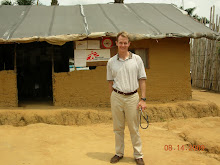
This whole Neurologist in The Tropics concept is rather new. Most people assume that all the Developing World needs is a good dose of primary care doctors. Two years ago when I taught in Malawi, several ex-pats wondered what my function would be. How do you use specialty care in this setting?
Vladimir, the ex-pat in charge of pediatrics here in Lubutu, asked me for a neurology consult. Two weeks ago, an eleven year old boy was admitted to the hospital with cerebral malaria. He was comatose for a few days and had several short seizures. All that was successfully treated. Unfortunately, he retained some weakness in the left arm and leg. The parasites that had infected his brain had caused a stroke.
He was now awake, alert, and normal except for his mild left sided weakness. His mother and the nurses were helping him to walk and care for himself. But something was odd. The boy did not understand that he needed assistance. If he wanted to get out of bed he would not call for help. He would swing both legs over the side, stand up, and fall trying to take his first step. So Vladimir called me.
When I examined him, the boy was awake, alert, and spoke good French. We talked for a bit and then I did a neurological examination. His left sided weakness was moderately severe. There was no way he could walk unassisted. I talked to him about his weakness and told him he would likely get better with time, possibly even back to normal. Rather than smile, cry, or thank me, he gave me a puzzled look. He denied he was weak at all.
Anosognosia. I had never before made this diagnosis in a child. It is a disorder I learned about while studying Adult Neurology. If there is damage to the right frontal and parietal lobes of the brain, the left side of the body is weakened. Interestingly, some patients are unaware that the left side of their body is abnormal. Others are not only unaware of their weakness but deny it. Show them their abnormal arm and they deny it is weak. Even wilder are the patients who recognize the weakened limbs are present, but deny that the abnormal arm and leg they see are their own. The patient recognizes the limbs are paralyzed, but state that they belong to someone else. That is anosognosia—unawareness or denial of paralysis. It is usually a left sided weakness caused by a stroke on the right side of the brain. In this case, it was from cerebral malaria.

So, are specialists needed in a developing country? Trying to answer this question is confusing me, leading me in circles. Yes, places like Congo need good primary care doctors, and lots of them. That is the standard model here. Open lots of small Centres de Santé scattered in all the tiny villages, all doing primary care. As a model to try to change the overall health of a population (mortality rates, burden of disease) this model doesn't work very well. The project in Lubutu is a reaction to this failure. Yes, in the area there are primary care Centres de Santé, but now there is a central Hôpital Générale de Réference (referral hospital) to accept sicker people as inpatients. As a public health model for lowering mortality rates, it has been very successful.
Two years ago, when I worked in Malawi, I was teaching at a super referral hospital, likely the best hospital in the country. I diagnosed and treated lots of children with neurological disease. Many of these kids had been undiagnosed or misdiagnosed. I know I impacted the lives of the children I cared for . Hopefully by teaching others to care for neurology patients, my impact was longer lasting. But did I make a meaningful dent in the public health of the population of Malawi? I doubt it.
In this context, should we be only working for the health of the population doing preventive care (like immunizations) and primary health care? Does caring for rarer problems matter?
I would love to say that this hospital in Lubutu doesn't need a full time neurologist. But they do. Walking around the hospital, I am positive the burden of neurological disease and neurological complications of other diseases would keep me busy full time. But would my presence impact the overall health of the population of just this tiny slice with neurological problems? If I improved the diagnosis and treatment of epilepsy or here, would I lower mortality rates? I doubt it. I would certainly improve the quality of life for the people with epilepsy, though. Available resources are important, too. There's not enough primary care doctors willing to volunteer or work here, let alone neurologists.
So what do the people of Lubutu need? As a primary care doctor here, I'm a necessity. As a neurologist, am I a luxury? Not if your child has cerebral malaria.

No comments:
Post a Comment